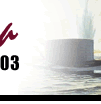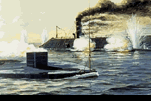Tournament Format
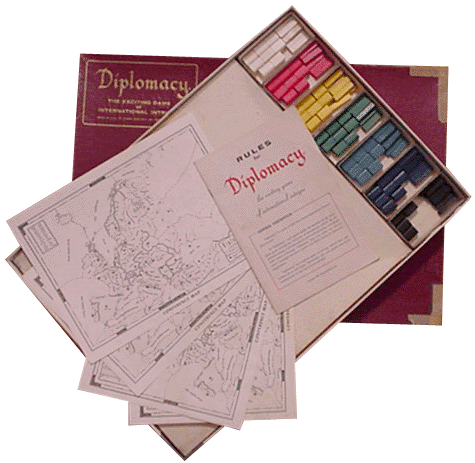 The
ARMADA tournament rules are unique and different and have sparked
a lot of comment. Most importantly, attendees of the Regatta
have come away believing that the tournament format was a resounding
success.
The
ARMADA tournament rules are unique and different and have sparked
a lot of comment. Most importantly, attendees of the Regatta
have come away believing that the tournament format was a resounding
success.
The Regatta consists of four rounds (or "heats"). The first
Regatta heat is held on Friday night, with two rounds held on
Saturday and the final round on Sunday morning.
A fifth round, perhaps with an emphasis on introducing novice
players to the game, may be held earlier Friday.
The top three scores for each player will determine
the player's ranking.
The tournament play rules are deliberately set up to result
in more victories than are typically seen in tournament play.
This makes for a very exciting and challenging game. This is
done by using David Norman's "Variable Length" tournament rule.
This rule accelerates the midgame so that endgame (stab to win,
and "uh oh, he can stab to win") play can occur in a timeframe
that is reachable under tournament conditions, all without resulting
in the artificial play that we see when a definite end-time
or end-year is set.
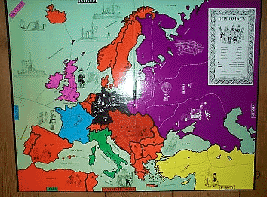 The "Variable Length" rule is simply this. Beginning in 1906,
the supply center count to obtain a solo victory is reduced
by one. That is, while it takes 18 centers to win in 1905, it
takes only 17 to win in 1906, and 16 to win in 1907, etc. To
win, a player must own the required number of centers and own
at least two more centers than the next largest player and
must have grown in size in the just-completed game-year.
The "Variable Length" rule is simply this. Beginning in 1906,
the supply center count to obtain a solo victory is reduced
by one. That is, while it takes 18 centers to win in 1905, it
takes only 17 to win in 1906, and 16 to win in 1907, etc. To
win, a player must own the required number of centers and own
at least two more centers than the next largest player and
must have grown in size in the just-completed game-year.
A draw can of course be declared at any time -- as can a concession
to a single power -- but the Regatta uses the DIAS rule.
All draws must include every player on the table. This rule
not only saves time but encourages the survival instinct of
all players.
Time of play will be controlled by the Australasian system
(all boards adjudicate simultaneously). Six hours are
scheduled for each round, and if a game reaches that time
limit, a DIAS draw is declared.
A specific, fixed point award is given to a solo victor, and
every participant in a draw (regardless of supply center count)
is given an equal share of the point award for the game.
Additionally, for each victor or participant in a draw,
one point is subtracted for each year of play (for example, eight
points are subtracted if the game ended in 1908). An eliminated
or surviving (but losing) player receives only one point for
each game-year that he played.
|
Not
Just a Tournament
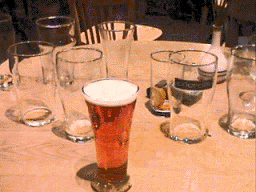 The
Regatta is a true Diplomacy convention, where
Diplomacy players convene and converse, not just play.
Despite two Saturday rounds, much of Saturday is given
over to presentations and a "State Dinner."
The
Regatta is a true Diplomacy convention, where
Diplomacy players convene and converse, not just play.
Despite two Saturday rounds, much of Saturday is given
over to presentations and a "State Dinner."
The lectures from hobby luminaries are a true must-see at
the Regatta. In the inaugural year, Edi Birsan and Chris
Martin educated and entertained in extremely valuable
presentations. At DipCon XXXIV, Chris reprised his talk
and was followed by the
eventual North American Champion, David Hood. All these
lectures (available on videotape) had a noticeable effect
on the level of play.
The "State Dinner" consists of a mass road-trip to a watering
hole for a group lunch (liquid or otherwise). Denver boasts
the highest number of brewpubs per capita in the entire
nation (including one in the convention hotel!),
and the State Dinner is one occasion when this fact comes in
very handy.
Speaking of beer, a hosted beer fest
will be held at the host
hotel before the Friday
evening round. With that kind of ad hoc and
planned conviviality, you have a good picture of the
ARMADA Regatta.
|
The
Previous Regattas
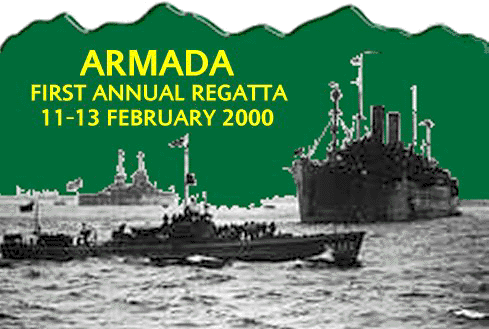 The
first Regatta, held in February, 2000, was a bigger success
than any of the ARMADA organizers could have hoped for. We
were fortunate enough to have several out of town guests,
including Chris Martin, Edi Birsan, Larry Peery, Matt Shields,
and Mike Hall.
The
first Regatta, held in February, 2000, was a bigger success
than any of the ARMADA organizers could have hoped for. We
were fortunate enough to have several out of town guests,
including Chris Martin, Edi Birsan, Larry Peery, Matt Shields,
and Mike Hall.
All told, the inaugural Regatta drew over forty players, with
four tables in each of the first three rounds, and three in
the final round. Especially considering that the concept
of the ARMADA was only a few months old when the Y2K event
was held, the inaugural Regatta was a roaring success.
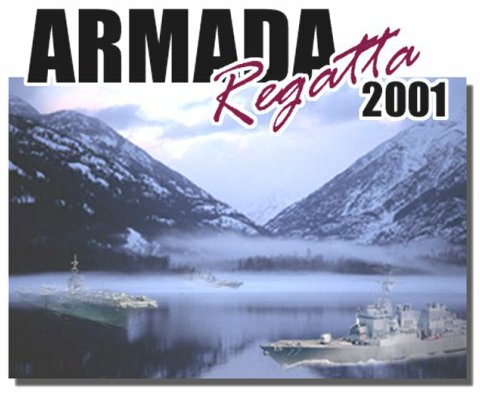 In fact, the first Regatta was so successful that Denver
was chosen to host the 2001 North American Championships,
and so Regatta II was also DipCon XXXIV. This event
drew 66 players from all over North America, and even from
across the Atlantic. With such names as David Hood,
Edi Birsan, Chris Martin, Tim Richardson,
Matt Shields, Mike Hall, Ike Porter, Andy Marshall, Buz
Eddy, Tom Kobrin, Spencer Bernard, and Dan
Mathias joining dozens of ARMADA members,
like Yarden Livnat, Dave Scully, and Eric Jurgeleit,
the 2001 event was truly incredible. Just ask anyone
about the negotiations in the food service hallway
(the perfect venue!)
In fact, the first Regatta was so successful that Denver
was chosen to host the 2001 North American Championships,
and so Regatta II was also DipCon XXXIV. This event
drew 66 players from all over North America, and even from
across the Atlantic. With such names as David Hood,
Edi Birsan, Chris Martin, Tim Richardson,
Matt Shields, Mike Hall, Ike Porter, Andy Marshall, Buz
Eddy, Tom Kobrin, Spencer Bernard, and Dan
Mathias joining dozens of ARMADA members,
like Yarden Livnat, Dave Scully, and Eric Jurgeleit,
the 2001 event was truly incredible. Just ask anyone
about the negotiations in the food service hallway
(the perfect venue!)
Each year, the Regatta has impressed the attendees. Just
listen to these testimonials:
"A fresh and unique look to tournament
Diplomacy worth exploring by the serious and casual player.
The tournament ran very well and is a credit to the
directors. The automated seeding system worked nicely.
The existence of the reduced solo center count
resulted in more solos and more excitement, especially in
the several games in which there was a last minute flip-flop
to create a winner. The idea of a seminar, often forgotten about
in the past, was a happy new twist to an old tradition gone missing
too long." --Edi Birsan
"A very well run event. Manus has some strong ideas about how a
tournament should be run, and the organizational ability to herd
all the cats in the right directions. I certainly plan on going
back next year! Why? Because the
tourney is DIAS, which I like, and because the unique scoring system tends
to put the emphasis on playing to win, rather than playing for a draw." --Chris Martin
"…Diplomacy a la Hand… a con connoiseur's con" --Larry
Peery
"The Regatta was a first-class operation from start to finish. Going in, I
had both high hopes and dark fears because I talked one of my best friends
into flying in from San Francisco to attend and play. My fears were
dispelled and my hopes realized when we arrived at the DTC Marriott and
discovered that the setting was comfortable, the tables were well-organized,
and the format was easily understandable and well-explained. The organizers
were simultaneously easy-going and eager to ensure that everyone experienced
a good time and a fairly adjudicated tournament. My friend and I ditched
our other plans and played all four rounds. At the end of the tourney
my San Francisco friend and I were both making plans to be back next year.
Six months later we are still looking forward to more stabbing in Denver
come the new year." -- Robert Anderson
"I have played Diplomacy for years and I was pleasantly surprised when I
played in the ARMADA Tournament. The tournament was very well run,
but what I enjoyed the most was the fact that everyone was so friendly.
The ARMADA group knows how to run and organize a tournament!" --Robert Andrew |
|
|


